Monkey books: The mother who helped ill children cope
- Published
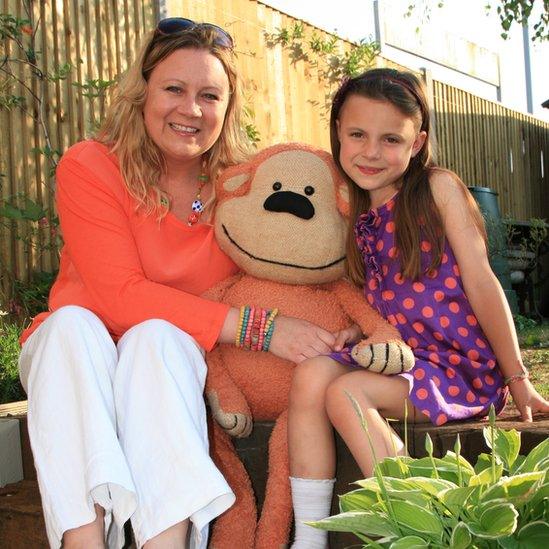
Josephine is now nearly seven years old and has had no problems with her lungs
A handwritten story book about a monkey written by a mother trying to soothe her toddler ahead of a major operation is now helping children at 19,000 schools across the UK.
Helen Sadler, from Glynde, East Sussex, drew the Monkey has an Operation story for her 18-month old daughter Josephine as she prepared for surgery on a congenital lung condition.
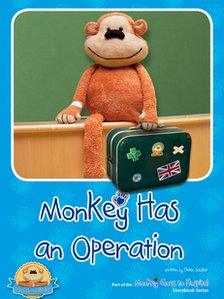
Helen Sadler wrote Monkey Has An Operation for her daughter
Now, almost six years later, the character forms part of a schools education pack aimed at teaching youngsters about situations they might encounter in hospitals, at the doctors and even in life.
It is also educates pupils about the National Health Service and encourages them to lead a healthy lifestyle.
Mrs Sadler was told at her 20 week scan, in April 2007, that the baby she was carrying had a condition that resulted in lung cysts being formed and that her child would need major surgery at 18 months old.
But, as she began to prepare Josephine for the operation at the Royal Alexandra Hospital in Brighton, Helen found there were no books to explain to her daughter what was happening.
"When we went in for the pre-operative appointment it was all pretty traumatic and quite terrifying," she said.
"The hospital had some really good photographs that talked you through the journey but we were not allowed to take them away.
"It was all very quick and you could not take anything on board and children are terrified just as much as parents are."
So, she decided to draw a character of a soft toy Monkey and created a story of him going into hospital for an operation.
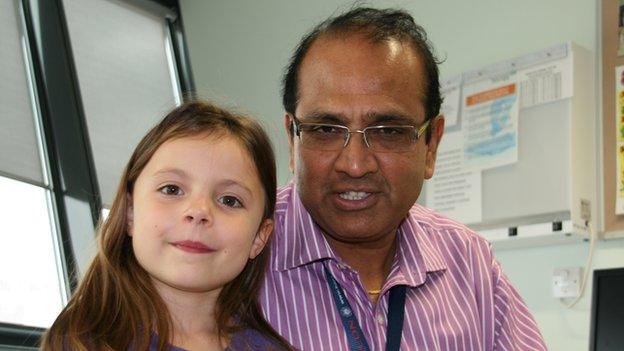
Josephine and Dr Varadarajan Kalidasan who carried out the pioneering lung surgery
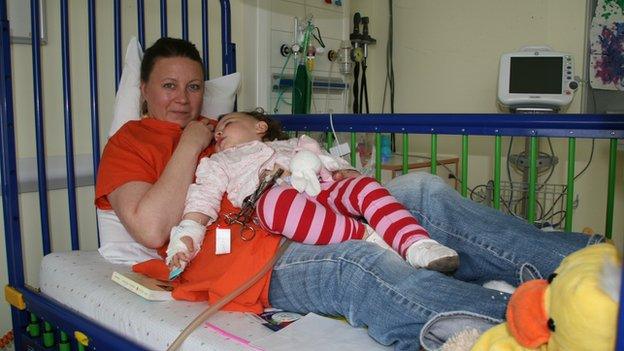
Helen Sadler and Josephine at the time of her operation in March 2009
"I made the storybook into a handwritten story that she took in with her and we must have read it every single day for three or four weeks beforehand," she said.
"By the time we got to to the operation she was walking in going "beep, beep, beep" at the machines and saying this is just like monkey.
"She was really confident and the consultants said it was really speeding up her recovery."
"For children coming into hospital repeatedly they are very scared and anxious, it is the fear of the unknown," said Dr Varadarajan Kalidasan, the consultant paediatrician who operated on Josephine.
"They can't vocalise it and sometimes they can't understand why they have to go through certain things.
"Using this concept of a pet, or an animal or a cuddly toy, it makes it more impersonal as if it is happening to someone else and the anxiety becomes less."
The success of the book persuaded Mrs Sadler to help others in the same situation. To pay for the first print run of Monkey Has An Operation, her husband Daniel organised a 100-mile charity walk.
Then the Royal Alexandra Hospital commissioned her to write a follow-up: Monkey Has A Blood Test.
It was that book that prompted Kath Evans, head of patient experience at NHS England, to ask her to write a lesson plan introducing primary school children to the NHS.
Now that lesson plan makes up a resource pack that has been sent to 19,000 schools up and down the UK.
It includes a guide book, stickers, a poster, hand puppet, a song and certificates to encourage children to exercise and eat well.
Ms Evans said she hoped Monkey would "become a children's hero" and enable future generations to take control of their health from an early age.
There are now more than 60 titles in the pipeline and Mrs Sadler is also working on a Monkey emotional health and wellbeing pack which she said had been quite difficult.
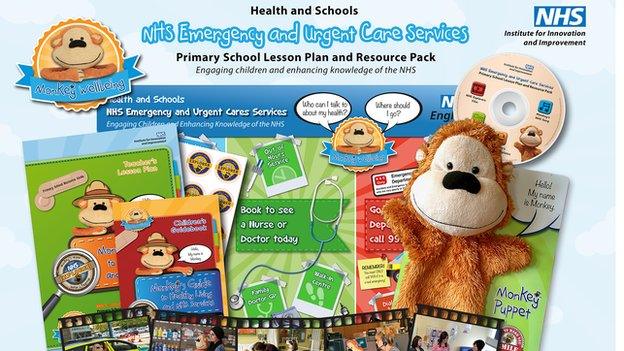
The pack has been sent out to 19,000 schools across the UK
"It is so harrowing to put together but it is really, really necessary," she said.
"We are tackling massive issues such as monkey witnessing alcohol abuse, domestic abuse, poverty, Monkey's mum and dad being too busy, or shouting a lot and he can be able to get through those situations."
Kirstie Mitchell, who used the books for her sons when they went into hospital for an ear operation, said it helped calm her children.
"It's very frightening when your child has to have a general anaesthetic, when you know they will have to go through this very unpleasant experience of having injections and being in a strange, unfamiliar place," she said.
"My youngest had an instant connection with it too as the Monkey in the storybook was almost identical to his favourite monkey toy."
And what does Josephine think about Monkey?
"She is really proud," says her mother.
"She says 'mummy, you are going off to help children feel better' and you think 'wow' what mother can ask for more than that?
"She is an inspiration."